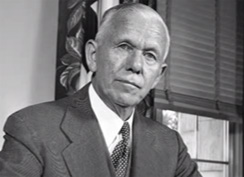Almanac: The Marshall Plan
And now a page from our "Sunday Morning" Almanac: June 5th, 1947, 69 years ago today ... the day the United States offered help to Europe as it struggled to recover from World War II.
For that was the day Secretary of State George C. Marshall announced the economic assistance plan that bears his name during a speech at Harvard:
"It is logical that the United States should do whatever it is able to do to assist in the return of normal economic health in the world, without which there can be no political stability and no assured peace."
Western Europe quickly embraced the Marshall Plan, while the Soviet Union and its Eastern European satellites rejected it.
Congress approved the plan in early 1948. And over the next four years, America provided some $13 billion in economic aid -- the equivalent of more than $100 billion today.
The Western European nations quickly revived, and went on to form what eventually would become the European Union.
By contrast, the Eastern European countries stagnated, leading ultimately to the Soviet bloc's collapse beginning in 1989.
Today, Europe is facing a new round of economic and political challenges, with Britain due to vote later this month on a possible exit from the European Union.
Developments even a visionary like George C. Marshall could never have planned on.
- 5 things to know about a possible "Brexit"
- President Obama weighs in on the E.U. "Brexit" debate ("CBS Evening News," 04/22/16)
- S&P: A Brexit could jeopardize pound's standing
- Ben Stein: Help eurozone with new Marshall Plan ("Sunday Morning," 06/10/12)
